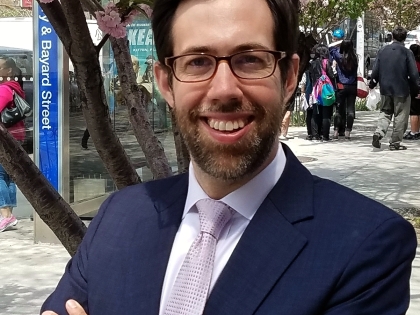
Landlord broke building, should fix it, tenants say
Feature article in The Villager
By Julie Shapiro
A month after the city emptied a Chinatown tenement because it was in danger of collapsing, the fate of the building and its 60 tenants is still in limbo.
The former residents of 128 Hester St. have mostly been staying with friends and family since the city vacated their building on Aug. 5. Represented by the nonprofit group Asian Americans for Equality, the tenants hope their building will be repaired so they can return to their rent-regulated units.
“If there’s any way to save the building safely for tenants, that would be a great conclusion,” said state Senator Daniel Squadron, who has made many phone calls on the tenants’ behalf. “You need to make sure it’s safe, but you also need to make sure you’re not losing affordable homes for the community.”
But the Department of Buildings thinks 128 Hester St. is too damaged to save and has ordered the owners to demolish it. The owners applied for a demolition permit and have hired a contractor.
In a last-ditch effort to stop the demolition, AAFE went to Housing Court two weeks ago and got an order for the owners to repair the building. An engineer hired by AAFE also concluded that the building is salvageable.
However, a D.O.B. engineer decided that the building should be demolished, and D.O.B.’s decision supersedes the Housing Court order, said Ryan Fitzgibbon, a department spokesperson.
As the tenants and the landlord duel over the building’s future, they have also been battling over who is to blame for its current condition.
The tenants say the building’s owners, a group of investors, are to blame.
“They caused this to happen,” said Myra Wong, who owned the Hong Kong Station restaurant on the ground floor of 128 Hester St. with her husband. She cited the many violations issued to the owners for failing to maintain the building and the fines they left unpaid. “It isn’t right,” she said.
The investors who own 128 Hester St., led by Chinatown hotelier William H. Su, also own an adjacent lot where they are building an 18-story hotel. Work on the hotel, at 91 Bowery, is part of what destabilized 128 Hester St., and the Buildings Department stopped work on the hotel last month after the project received many safety violations and racked up thousands of dollars of unpaid fines.
Right after the vacate order, Borough President Scott Stringer and AAFE criticized Su for neglecting 128 Hester St. and leaving the tenants without a home. When The Villager tried to speak to Su early last month, he denied owning 128 Hester St. and declined to answer questions.
But after several weeks of criticism, Su fought back, holding a press conference Aug. 20 in which he acknowledged co-owning 128 Hester. In halting English, he read a lengthy statement describing himself and his partners as hardworking businessmen who wanted to build the Bowery hotel to create new jobs and help the neighborhood.
Su said he realized that 128 Hester St. was in poor condition and that the hotel work could further harm the building, so several years ago he urged the building’s owner to make improvements. When the owner refused, Su said he bought 128 Hester St. in 2007 so he could do the repairs himself.
Su added that, during the past two years, he spent more than $100,000 to brace and stabilize 128 Hester. He also redesigned the foundation of the Bowery hotel to move it away from the foundation of 128 Hester.
“No one spends $100,000 on a building if the plan is to take it down,” said Stuart Klein, Su’s lawyer.
Su said he has nothing to gain by demolishing 128 Hester St., since the lot cannot be combined with his hotel and it is too small to build another residential structure, because of zoning rules. The lot could hold a community-facility building with commercial uses, Su noted.
Timothy Lynch, an engineer with the Buildings Department, wrote a detailed report on the causes of 128 Hester’s condition that corroborates some of what Su said. The building, built in the late 1800s, was destabilized both by work on the Bowery hotel and by excavation on its other side in a now-abandoned lot at 126 Hester St., Lynch said.
Lynch acknowledged that Su and the other investors repaired some of the damage, but he places most of the blame for the building’s condition on them. In the report, Lynch notes in underlined type that the owners were slow to address recent Buildings violations.
“The Department ordered the owner to monitor and stabilize/repair the damage,” Lynch wrote last month. “Little of either was done, resulting in the continued degradation of 128 Hester St. The owner informed the Department a few weeks ago that they wish to demolish 128 Hester St. and have effectively stopped maintaining the building. ... The building cannot remain in this unsafe condition and is recommended to be demolished immediately.”
Su later refused to answer questions about violations and fines at his properties and said he did not write the statement he read at his press conference.
Klein, Su’s lawyer, said D.O.B.’s report “is not the full story” because it does not detail all the work that Su put into the building.
During the press conference, Su said that when he realized the building was growing unsafe, he gave tenants plenty of notice and offered to help them, but none of them contacted him. He said he is still willing to help them, but now he does not know where to reach them.
But the flier Su posted at 128 Hester St. before the vacate directed tenants to call 311, not Su, if they had concerns. Wong, the restaurant owner, said tenants did not trust the landlord and even when they called him, he did not return their calls.